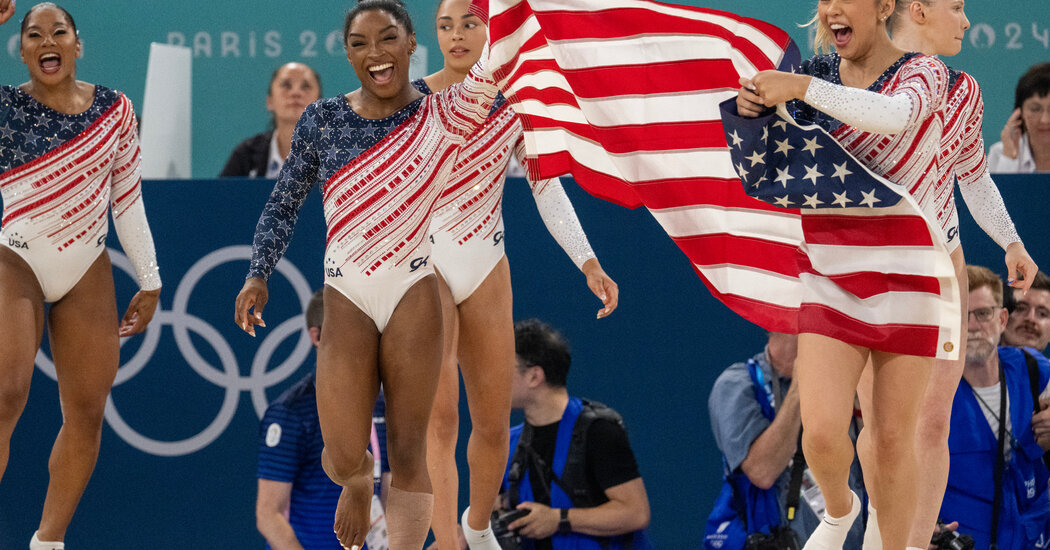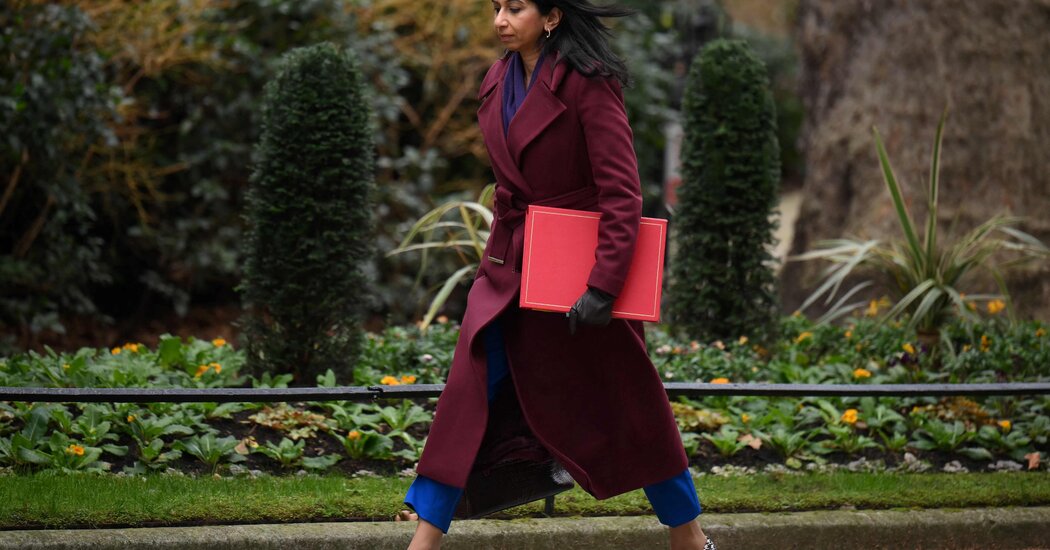Success and failure. Exhilaration and agony. Gold, silver and bronze.
The Olympics will always turn on who won and who lost, how high and how fast and how far. But they linger in our minds long after they end for moments that might have little to do with the actual competitions.
The Queen
Jordan Chiles and Simone Biles came up with the plan. They had both wanted to be on the top step of the medal stand after the final event of the women’s gymnastics competition, the floor exercise. But Biles, the favorite, had made a few mistakes, and Chiles had made a few more, so they instead became bookends to the true headliner: Rebeca Andrade of Brazil. And so a plan was hatched.
After Chiles accepted her bronze medal (temporarily, it turned out) and Biles her silver, Andrade was introduced as the Olympic champion. As she approached the podium — completing the first all-Black podium in Olympic gymnastics history — Biles and Chiles turned to Andrade, dropped to one knee and bowed. Afterward, they called her a queen. — JULIET MACUR
After Bobby Finke won the 1,500-meter freestyle in world-record time — preserving American men’s 120-year streak of winning at least one individual swimming gold at the Olympic Games — the NBC cameras panned to a particularly excited fan. She screamed. She pumped her fists. She clanged her cowbell.
The fan’s name is Katie Ledecky. And for one ecstatic moment, the most decorated women’s swimmer ever appeared to lose her breath. Ledecky had won her own gold at that distance four days earlier. That night, she said that thinking about her training partners, like Finke, had been one of the things that got her through.
So when she turned up to cheer him on four days later, she was not just a 14-time Olympic medalist but the friend and teammate who carries a cowbell and celebrates their successes more fervently than her own. — JENNY VRENTAS
Tears of Joy at Roland Garros
Novak Djokovic, a 37-year-old Serb, has done so much in his tennis career: winning 24 Grand Slam singles titles, earning the world No. 1 ranking and raking in over $180 million in prize money. But when he finally achieved the only major milestone missing from his illustrious résumé, an Olympic gold medal, he was overcome with emotion.
Normally unflappable, Djokovic got down onto the clay at Roland Garros and hunched over. His hands trembled. When he sat on the bench to cry some more, his body shook. He ran into the stands to find his family and sobbed as he held his 6-year-old daughter. “Biggest achievement in my career,” he said. — JAMES WAGNER
Running Until It Hurts
The men’s 200-meter final had ended and Noah Lyles had won the bronze. But suddenly that was not the story. Lyles dropped to a knee and then onto his back on the track, gasping for breath. He asked nearby workers for help. They brought over water and a wheelchair. Something was not right. Lyles was rolled away, disappearing under the stands.
About 45 minutes later, he reappeared wearing a face mask. He revealed that he had tested positive for the coronavirus two days earlier. He had told no one who didn’t need to know, fearing that disclosure of the news would cause a panic or give his competition “an edge,” and then advanced to the final with what was, in hindsight, an understandably lackluster semifinal effort. Now he had his medal. Not gold, like the one he won in the 100, but something to celebrate. “To be honest,” he said, “I’m more proud than anything.” — ANDREW DAS
Whenever Léon Marchand dove off the starting block into the pool, La Défense Arena thrummed with indistinct cheers. But then, in the individual medley, Marchand changed from backstroke to breaststroke, and the noise changed, too. It became a beating call.
Every time Marchand emerged from the water to breathe, the crowd shouted his name. When he submerged, the fans fell silent. “Léon! Léon! Léon!” From the stands, it felt as if they were blowing air into him, filling his lungs with their hope and joy. — CATHERINE PORTER
Snoop, Flav and Sports
Whenever and wherever American athletes competed, there always seemed to be a hip-hop icon cheering them on.
Flavor Flav, the Public Enemy rapper, went all in for women’s water polo. But it was Snoop Dogg who became ubiquitous, amplifying the athletes through his role as an special correspondent for NBC and his endlessly wide-eyed perspective of the action during prime-time broadcasts. He swam with Michael Phelps. He danced with Simone Biles. He rode a horse at equestrian.
“They want Snoop Dogg,” he said in an interview before the Games. He was talking about NBC’s vow not to water down his personality. But he might as well have been talking about the audience, too. — EMMANUEL MORGAN
Narrow Margin
Armand Duplantis, known as Mondo, had already clinched his second consecutive Olympic gold medal in the men’s pole vault. But few in the crowd of roughly 75,000 at the Stade de France in St.-Denis were ready to leave. Duplantis, 24, would now try to set a world record for the ninth time since 2020.
His career has been built on great skill and savvy decision-making. He grew up in Lafayette, La., but competes for his mother’s native Sweden, which selects its team instead of subjecting its athletes to the crucible of Olympic trials for a spot. And with a bonus of up to $100,000 available for a world record, he maximizes his paydays by inching the mark higher one centimeter at a time. On Monday, the bar was set at 6.25 meters (20 feet 6 inches). Duplantis missed once, then twice. On his third and final attempt, he fell to earth while the bar remained on its perch. He had another record, sliced as thinly as an onion. — JERÉ LONGMAN
Olympians are accustomed to waiting. They wait for the day of their competition. Then they wait for their game or match, their heat or their turn on the mat. If they advance, they wait some more.
Cut to Stephen Nedoroscik, an American gymnast and specifically a pommel horse specialist. All around Bercy Arena, men were competing on different apparatuses. Nedoroscik, 25, knew better than to waste his energy keeping track of who was doing what. Cameras caught him resting his head on the wall behind him, glasses on, eyes closed.
It was a smart strategy. When it was his turn to compete, Nedoroscik took off his glasses, stepped up to the pommel horse and nailed his routine. He helped the United States clinch the team bronze. His wait, at last, was over. — TALYA MINSBERG




